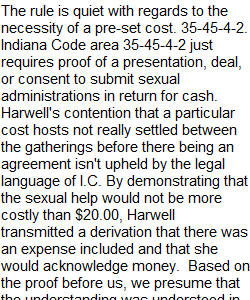


Q We've talked previously about the actus reas requirement of crime. A crime cannot be committed unless there is a guilty act. Therefore, a person can't be arrested for "being" a drug addict, a homeless person, or a prostitute. But a person could be arreted for being under the influence of drugs, for loitering or trespass, or engaging in an act of prostitution. When police officers working in Vice squads crack down on prostitution, they often do so undercover. They must reach an agreement and then exchange money in order to prove the actus reas of prostitution. That's not always easy because prostitutes are wary of undercover officers. They want the officer to do something to prove that they aren't an officer such as touch a part of their body (such as her breast) or even unzip their pants and expose themselves. If an undercover officer refuses to do so, the prostitute will refuse to come to an agreement and take money because they want to avoid getting arrested. It's a fine line that officers must walk. Let's read Harwell v. State (I've included it below - if you have the 4th Ed. of our book, you'll find it in the book). Then answer the following questions. 1. Do you think there was an "agreement" between the defendant and the undercover officer? What facts indicate that there was arguably and agreement? 2. Should a specific price have to be agreed upon? 3. What do you think the court decided? After finishing your post, you'll be able to see my post with the court's decision. Is it what you thought it would be? Do you agree with the court? (You'll see that she was convicted in trial court, the question is whether the appellate court upheld the conviction or reversed it.) Facts: On September 12, 2003, Officer David Miller (Officer Miller) of the Indianapolis Police Department was investigating prostitution complaints in the College corridor, the area between Washington Street and 38th Street, in Indianapolis, Indiana. ? His undercover investigation consisted of driving around the area looking for prostitutes. ? At approximately 2:45 p.m., Officer Miller observed Harwell on the corner of 22nd street and College Avenue. ? Upon stopping at the side of the road, he inquired if Harwell needed a ride. ? Without responding, Harwell entered the car and asked Officer Miller if he was a police officer. ? After denying he was a police officer, Officer Miller asked her if anything was going on, a question he uses to determine if women are looking to commit sexual acts. ? He further specified he was looking for fellatio. ? Although Harwell agreed to perform fellatio, she refused to discuss money when he asked about the price. ? Instead, she directed him towards an alley off the 2100 block of Yandes. ? When they arrived in the alley, Officer Miller again questioned Harwell about the cost, asking her if the act would be more than $20.00. ? Harwell simply responded “no.” (Transcript p. 5). ? At that point, Officer Miller informed her that he was a police officer and that she was under arrest. On November 13, the State filed an information against Harwell, charging her with Count I, prostitution, a Class A misdemeanor. ? That same day, the State amended the charging information by adding Part II of Count I, prostitution, as a Class D felony, based on Harwell's two prior convictions for the same offense. ? On January 26, 2004, a bench trial was held. ? At the close of the evidence, the trial court found Harwell guilty of prostitution, a Class D felony and sentenced her to five hundred and forty-five days of incarceration at the Indiana Department of Correction.
View Related Questions